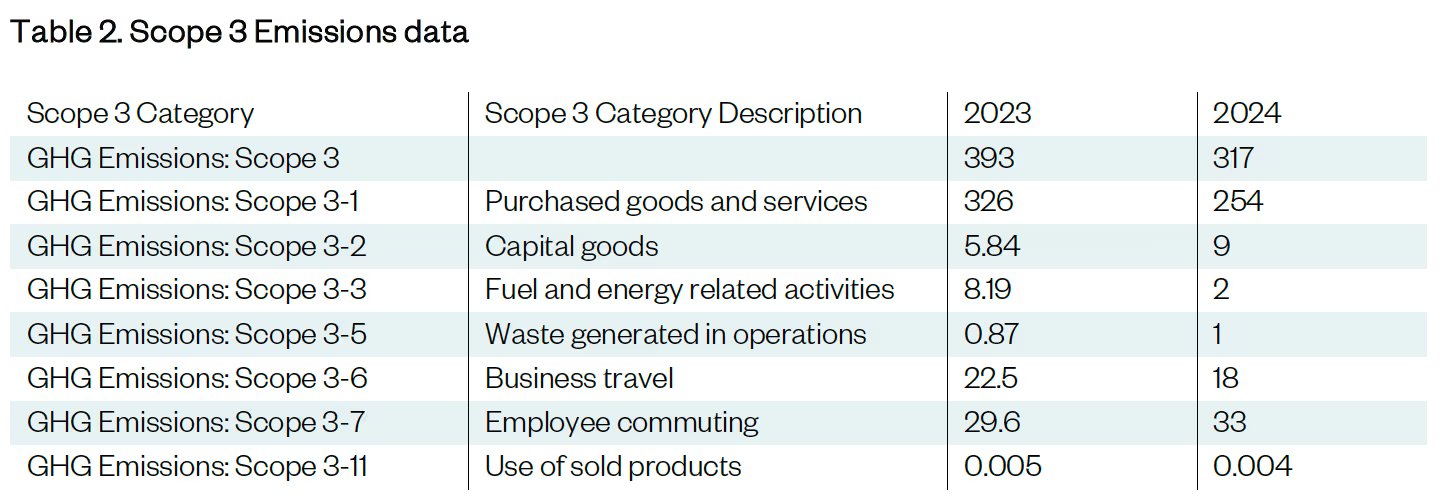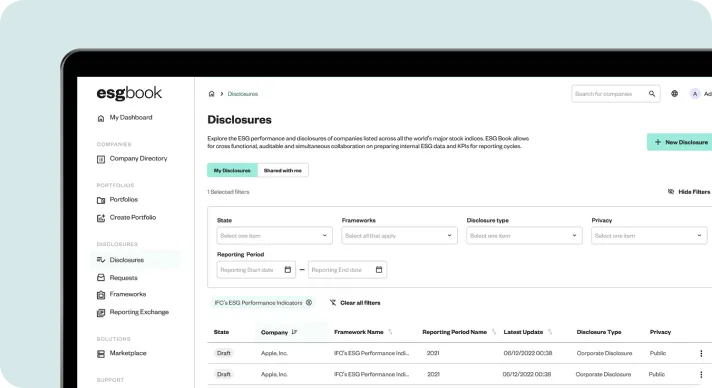Sustainability Report: 2024 Highlights & Impacts

Statement from the CEO
2024 was a year of meaningful progress for ESG Book — a year in which we deepened our commitment to sustainability, strengthened our governance, and continued to deliver innovation for our clients and partners. Our mission has always been clear: to power financial markets with the insight needed for a more sustainable future.
This past year, we made significant strides in our own sustainability journey. We cut our Scope 1 and 2 emissions by 91% from our 2018 baseline — surpassing our SBTi target — and achieved a 19% reduction in Scope 3 emissions. We continued to invest in our people, expanding global benefits, introducing our
Virtual Shares Incentive Programme (VSIP), and reinforcing our culture of flexibility, inclusion, and shared success.
In governance, we strengthened our data protection practices and achieved ISO 27001 certification in Q1 2025 — an important milestone in our ongoing focus on risk management, transparency and accountability.
As we look ahead, we remain committed to advancing sustainability both through our operations and through the impact of our products and client relationships. Our technology empowers companies and financial institutions to make better decisions, align with global frameworks, and accelerate the transition to a more sustainable economy.
We recognise that our work is far from done. Each year, we aim to enhance the quality, transparency, and scope of our own reporting — ensuring that we lead not only through our words , but also through our actions.
Together with our people, clients, and partners, we look forward to building on this momentum and using data and technology to build a more resilient and sustainable world.
Justin Fitzpatrick
Chief Executive Officer, ESG Book
Introduction to ESG Book
ESG Book powers financial markets with the insight needed for a more sustainable future. By seamlessly integrating sustainability data with an advanced disclosure platform, we enable financial institutions and corporates to share and interpret mission-critical sustainability information. Established in 2018, ESG
Book's cloud-based solutions are trusted by the world’s largest banks, corporates, investors, and consultants to navigate the complexities of sustainability with precision and efficiency.
Covering over 76,000 companies, ESG Book’s platform enables clients to access ESG and climate metrics at both the company and portfolio level. The firm’s SaaS-based data management and disclosure platform provides access to more than 220,000 corporate disclosures, allowing companies to report to
stakeholders in real-time across multiple frameworks.
As a talent- and innovation-led organisation, ESG Book’s people drive its differentiation and competitiveness. The company is deeply committed to investing in its workforce, fostering an environment that encourages drive, collective endeavour and a commitment to excellence.
In addition to delivering ESG and climate data through enterprise feeds, ESG Book’s flagship products — the ESG Performance Score and ESG Risk Score — enable clients to align portfolios with frameworks such as SASB’s Materiality Map and the UN Global Compact. Its suite of climate analytics supports
alignment with the GHG Protocol and the Paris Agreement.
In 2024, ESG Book made major advancements in its disclosure capabilities, enabling both public and private companies to report against sustainability frameworks, as well as global standards such as ESRS, GRI, and SASB. This strategic focus reflects a broader industry shift towards the growth and resilience of private markets — an area where ESG Book continues to lead through innovation.
ESG Book is an active contributor to the global sustainability ecosystem, partnering with international organisations including the EFRAG Voluntary Sustainability Reporting Standard (VSME) Community and Banking for Net Zero (B4NZ), participating in the AFME European Sustainable Finance Conference, and partnering with IFRS and the Global Reporting Initiative (GRI).
In this context, we are pleased to present the 2024 non-financial overview of our sustainability policies, initiatives, metrics, and targets. We plan to enhance our reporting each year, in line with frameworks including SASB, the UNGC, and the Voluntary Sustainability Reporting Standard (VSME) to ensure
consistent and comparable reporting, increasing our coverage of material metrics year-on-year.
Our Environmental Commitment
In 2024 ESG Book set up its employee-led Sustainability Committee who is responsible for our environmental commitments. As the first step on this journey, the Sustainability Committee has published our Environmental Statement, outlining our commitment to address pivotal environmental concerns that
intersect with our business operations, to serve as a catalyst for positive change within our operations and direct supply chain, and to make a positive impact within the communities in which we work.
ESG Book’s commitment is also confirmed by our alignment with action to keep the increase in global temperature to 1.5 degrees Celsius. In 2023, ESG Book set a target with the Science Based Targets initiative (SBTi), committing to an emissions reduction in line with a 1.5 degrees Celsius pathway, and to measuring our scope 3 emissions. This year for the first time we are publishing data to fulfil this commitment, having worked with external carbon accounting company Carbometrix to produce a first estimate of our Scope 3 Emissions..
is the original citation of our commitment can be found on the Science Based Targets initiative website.
Climate Change
As a business, we are committed to reducing our greenhouse gas emissions and have taken action to realise this ambition through the SBTi target above. Our operational computing is already hosted on Google’s Cloud Platform, which has a net-zero emissions target. In London, we relocated to new office
space that has allowed us to reduce associated impacts and eliminate the last of our scope 1 emissions.
As included in our new Environmental Statement, our next steps will be to improve energy efficiency and use renewable electricity sources where available. Additionally, flexible working arrangements continue and we provide our employees with increased flexibility on working location, reducing the need for daily
commuting. Our travel policy also encourages employees to make sustainable choices when travelling for business.
An employee survey revealed that in 2024, only 11% of employees chose to travel to work by car or motor scooter, 78% opted for public transport, with the remaining few split between walking and cycling. The same survey also revealed that 77% lunch-time meals taken by employees are vegetarian.
Quantifying our Impact
ESG Book (then Arabesque S-Ray) first started measuring our greenhouse gas emissions from a baseline of 2018, and in October 2020 had a ‘well below 2 degrees Celsius’ emissions reduction target approved by the SBTi, a reduction of 30% based on baseline 2018 figures. After the company rebranded to ESG
Book, we re-applied for a stronger 1.5 degree target, which was set in September 2023.
For our 2018 baseline, our scope 1 emissions were 73 tCO2e, and our scope 2 emissions were 106 tCO2e. Table 1 shows our emissions break-down by scope in 2018, 2019, 2021, 2022, and 2023. These were measured to align with the GHG protocol, and our scope two emissions were calculated from our energy
usage using the location-based method, with both Scope 1 & 2 calculations respectively using local gas & electricity conversion factors for 2021. In 2020 ESG Book’s workforce was almost entirely working from home. As a result, we do not have comparable figures for 2020.
From 2022, we have been working with external carbon accounting company, Carbometrix, to more accurately and expansively measure our Greenhouse Gas emissions. Our 2024 emission figures show a total reduction in our scope 1 and scope 2 emissions of 91% from the 2018 baseline, far more than required
for our current SBTi target, driven by the switch away from office space using gas heating and the downsizing of our office following a more flexible remote hybrid working policy.

Our work with Carbometrix has allowed us to publish for the first time an estimate of our Scope 3 emissions, displayed in Table 1 and broken down further in Table 2. These tables show that our Scope 3 emissions are likely to significantly outweigh our Scope 1 and Scope 2 emissions. The largest contributor
by far is Purchased goods and services, specifically from intellectual service providers and data providers, and we intend to use this analysis to help pinpoint where we can make improvements in the coming years. Table 1 shows that we have additionally reduced our scope 3 emissions by 19% over the last year, this is partially due to improved data from our suppliers, but also due to reduced spending on external services.

Our Social Policies
In 2024 we introduced a wide range of new and upgraded employee benefits, including employee ownership for all employees.
We are very pleased to announce that we have fully rolled out a Virtual Shares Incentive Programme (VSIP) for all full-time permanent employees in all locations. At ESG Book, we believe in aligning the success of our company with the contributions of our team. The Virtual Shares Incentive Programme is designed to reward and motivate employees by providing them with a stake in the future growth and success of the business, and reflects our commitment to recognising the long-term value creation of our team members.
Additionally, ESG Book is now pleased to offer global access to both eyecare and general healthcare / medical insurance which, in the UK, includes cover for an employee's partner and children. We also provide global income protection through Canada Life, Life insurance through Group Life Assurance, and
employee assistance through TELUS who offer emotional, financial, wellbeing and other work-related support.
To help employees better manage their time and commitments outside of work, we provide a high degree of flexibility structured around “core hours” in each office location.. Additionally, in July and August we offer Summer Fridays where every Friday employees are encouraged to reduce their commitments after
midday, and finish their work day by 2pm. Employees also receive 30 days annual leave globally, plus any local or bank holidays applicable in their location.
ESG Book offers learning and development opportunities for all employees, with each employee having a personal yearly budget they can spend on their own learning and development objectives, including but not limited to training programmes and online courses and certificates.
Beyond global benefits, we have an additional range of benefits offered country-by-country. This includes pension schemes in the UK and Germany where ESG Book contributes 3%, up to a salary threshold of £50,270, and 9.3%, up to a salary threshold of €90,600, respectively. Additionally, the UK Cycle to Work
Scheme, allows employees to purchase bicycles tax-free through salary sacrifice, and Wellpass in Germany gives employees access to fitness and wellness facilities throughout the country.
Non-Discrimination and Diversity
We have an unwavering commitment to inclusion and diversity and a culture of equality, which is core to our values as a company and critical to our success and continued innovation.
ESG Book maintains a diversity policy that outlines our commitment to inclusion, equality, diversity, and the elimination of any form of discrimination. To this end, ESG Book is proud to be an equal opportunities employer. As such, all job listings include statements affirming that all applicants will be considered equally
irrespective of race, colour, religion, national origin, sex, physical or mental disability, or age.

ESG Book is committed to equal pay, as outlined in our Equal Pay Policy, and each position has a pay structure, regardless of gender, race, colour, religion, national origin, physical or mental disability, or age.
We outline in Table 3 the employee breakdown at different levels by gender, averaged yearly, and in Table 4, the number of new hires by region and gender. The median gender pay-gap within ESG Book is 13.67% (Table 5), while the mean is 58.4% (Table 6), both calculated according to the UK government guidance
and methodology. This discrepancy is caused by an imbalance at the highest level of our company, where we have significantly more Males than Females at the Director and Partner level – ten and one, respectively (Table 3). This imbalance between Male and Female employees is not seen at lower levels, where Females make up 48% of our workforce (Table 3).



While we do not yet measure ethnic diversity within ESG Book, as we grow, we are committed to building a highly diverse team that is inclusive for all.
Employee Retention
Throughout the year, we continued to deliver on our commitments to our people. ESG Book recognises that providing employees with the opportunity for personal and professional progression can be a critical factor in employee satisfaction and happiness.
We recognise that fostering talent and providing employees with opportunities for growth is key for employee engagement and retention. To this end, ESG Book’s employee performance management policy ensures a regular formalised performance review process that helps employees progress through
their careers by identifying areas where the employee wants to develop and allows for open discussion on areas for improvement. Outlined below (Table 6) is the full-time employee annual turnover, calculated excluding contractors and interns. ESG Book is continuously changing and growing its business, going
through a scale-up phase, so higher levels of turnover are to be expected. However, we are taking the necessary steps to reduce turnover moving forwards to create a stable foundation for future growth. ESG Book undertakes detailed exit interviews, the results of which are now helping inform company policies
and benefits introduced in 2024.

ESG Book strives to continually learn and improve through anonymised quarterly employee wellbeing surveys, used to identify areas of improvement and help increase retention and employee satisfaction. These surveys, introduced in Q2 of this year, are run through the HR tool HiBob. Engagement across the
year averaged at 76% with our employee NPS score averaging at 35.7 21.3 points above the benchmark of 14.4 (the scale runs from -100 to 100).

While the business saw an increase in employee turnover on an annualised basis in 2024, turnover dropped from a high of 15.9% in Q2 to 6.9% in Q1, below our historical average. This positive trend continued into Q1 2025, indicating that the changes implemented are having a measurable impact on employee
satisfaction.
Data Protection and Privacy
ESG Book takes active steps to protect the data of its employees, clients and other data subjects. We conduct our business in accordance with all applicable Data Protection laws and regulations and in line with the highest standards of ethical conduct.
The ESG Book Data Protection Policy sets forth the expected behaviours of employees and third parties in relation to the collection, use, retention, transfer, disclosure and destruction of any personal data belonging to any data subject This policy outlines how ESG Book implements our commitments and
conforms to the EU’s General Data Protection Regulation (GDPR), the UK GDPR, and the UK DPA 2018.
Additionally, every employee has Endpoint installed on their company laptop to ensure all equipment is data protection compliant. As part of this, the company is restricted from seeing files, passwords, emails, or any private messages, further safeguarding employee privacy. In the case of data-related incidents, we have a thorough Incident Management Policy and Procedure designed to swiftly identify, address, and resolve incidents that may threaten our core tenets of continuous operation, optimal functionality, and information security.
Our complete range of Risk and Security documentation features specific policies and procedures for each of the following key areas:
- Access Control
- Asset Management
- Incident Management
- Information Management
- Information Security, Third Party Management
- Infrastructure Management
- Remote Working
- Risk Management
- Secure Development
Finally, H2-24, we started to prepare for IS0 27001 certification, which the company was awarded in Q1-25. This provides a framework and policies for the secure management of financial information, intellectual property, employee details and information entrusted by third parties.
Human Rights
Our statement on Human Rights outlines our alignment with the UN Global Compact and the UN Principles for Responsible Investment, as well as our commitment to the following standards:
- Universal Declaration on Human Rights
- International Covenant on Civil and Political Rights
- International Covenant on Economic, Social, and Cultural Rights
- International Labour Organisation’s (ILO) Declaration on Fundamental Principles and Rights at Work
- UK Modern Slavery Act 2015.
In alignment with ESG Book’s endorsement of the International Labour Organisation (ILO)’s Declaration on Fundamental Principles and Rights at Work, ESG Book personnel are free to associate and organise themselves collectively in accordance with local laws. ESG Book has never been subject to any
investigation, legal proceedings or incidents involving Human Rights abuses. All ESG Book staff work on a contractual basis with a strong element of alignment of interest in the success of the business. We do not tolerate forced, coerced, compulsory, or child labour within our business or
within that of our business partners.
Our Governance
ESG Book is committed to maintaining high standards of governance to support transparency, accountability, and sustainable growth.
Advisory Board
The company is governed by an Advisory Board, which is composed of representatives from our shareholder organisations. This board plays a critical role in shaping ESG Book’s strategic direction and ensuring alignment with the long-term interests of our stakeholders. While the Advisory Board does not
hold formal fiduciary duties, it provides experienced, independent perspectives that help guide the business through key decisions. As of 2024, the Advisory Board comprises six members, including our Chief Executive Officer, Justin Fitzpatrick, and five additional representatives. Of these, one member is
female. ESG Book recognises the importance of diversity in leadership and is committed to enhancing representation and inclusion across all levels of governance as the organisation grows.
Conclusion
ESG Book aims to continue to grow on this foundation over the next year, focussing primarily on improving employee satisfaction and retention. Key priorities for this drive include benchmarking our salaries and equity scheme against industry peers, building a comprehensive career development framework, and
introducing a mentoring system. In addition, we will continue to explore ways to support opportunities and equality in the workplace, and we will strive to further reduce our emissions by, for example, transitioning to renewable sources for our remaining electricity needs, and seeking office sustainability certification. We hope that by embedding sustainability into the culture and practices of ESG Book we will facilitate our ability to deliver meaningful outcomes for both our staff and our clients.




